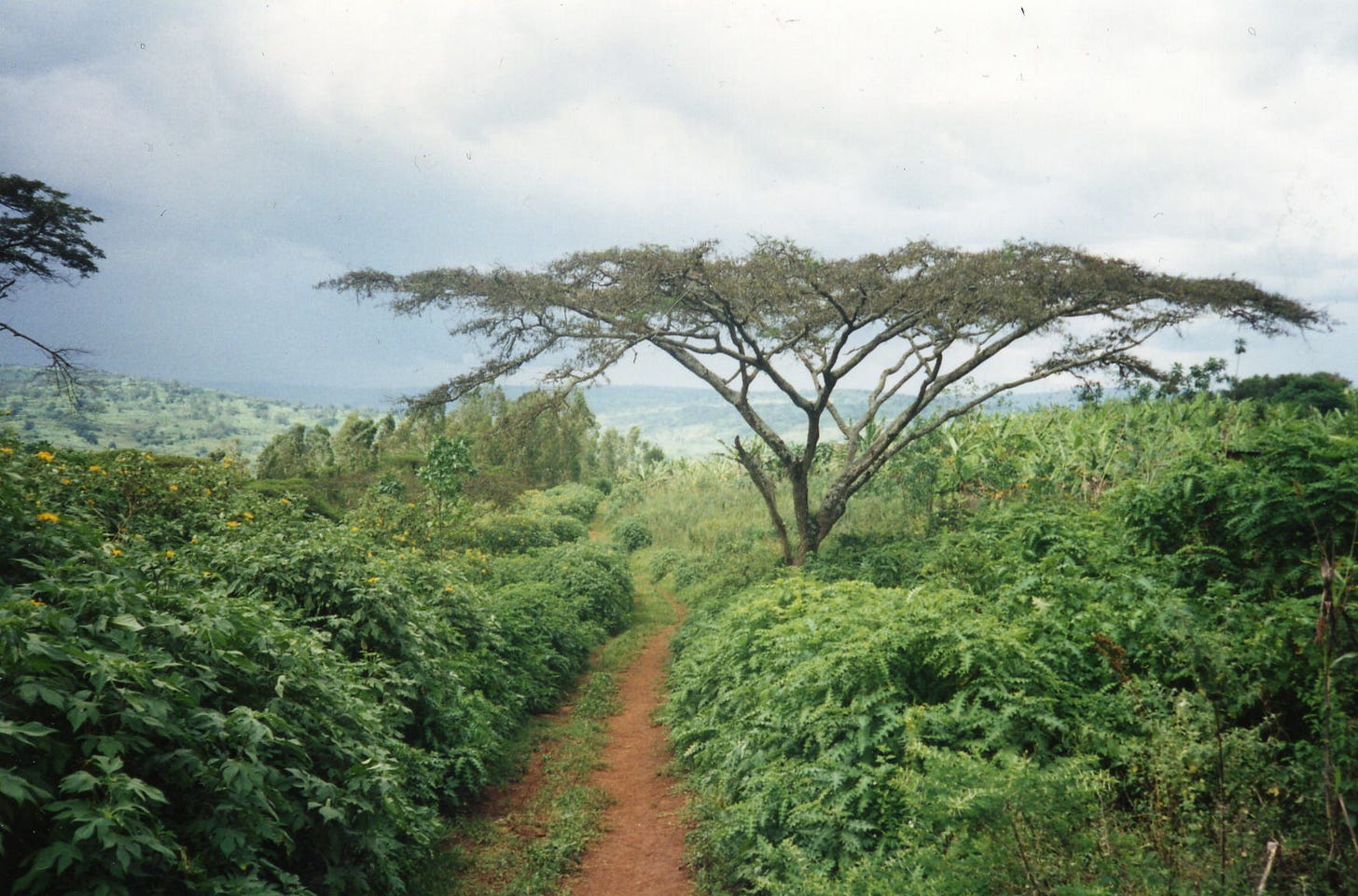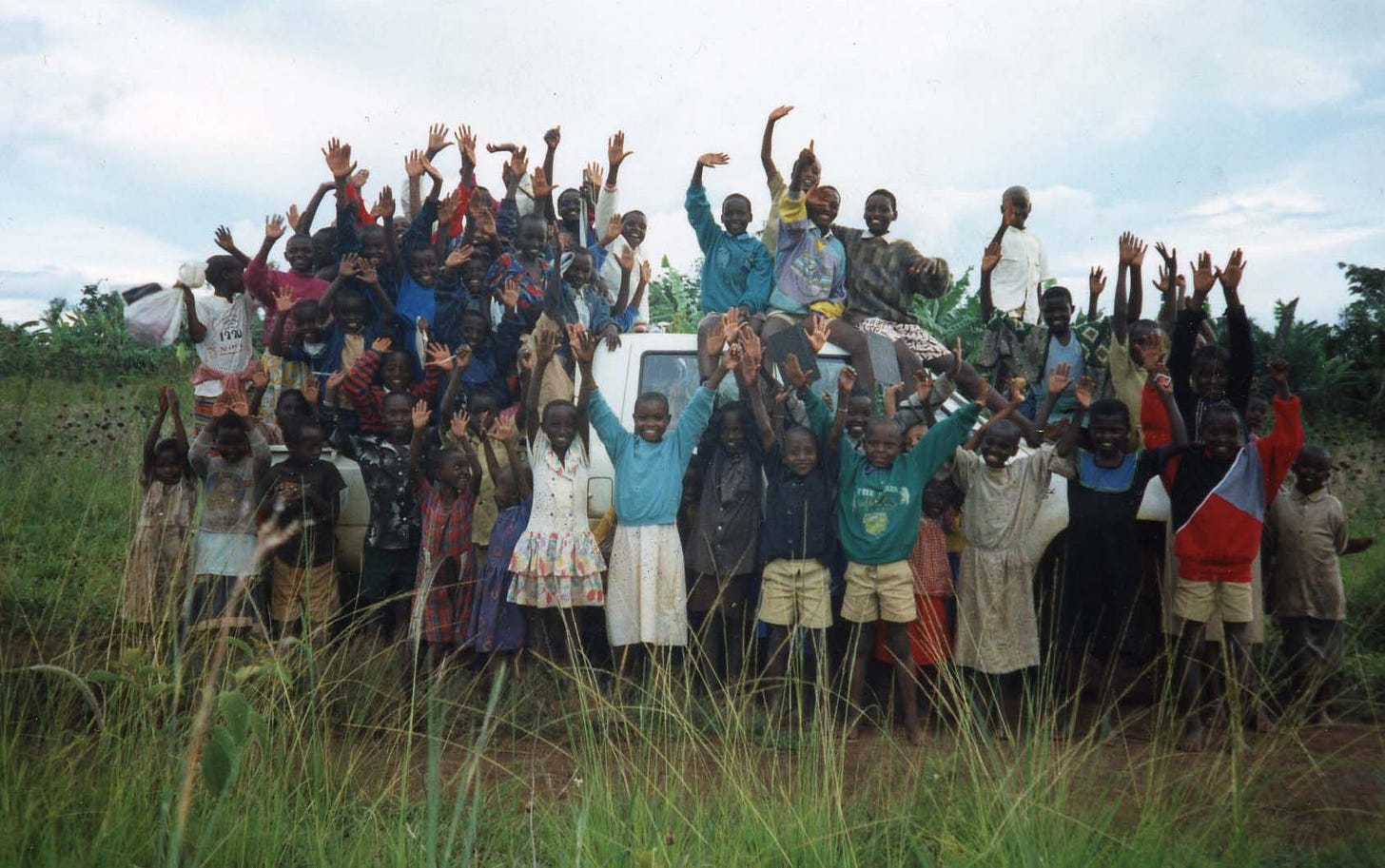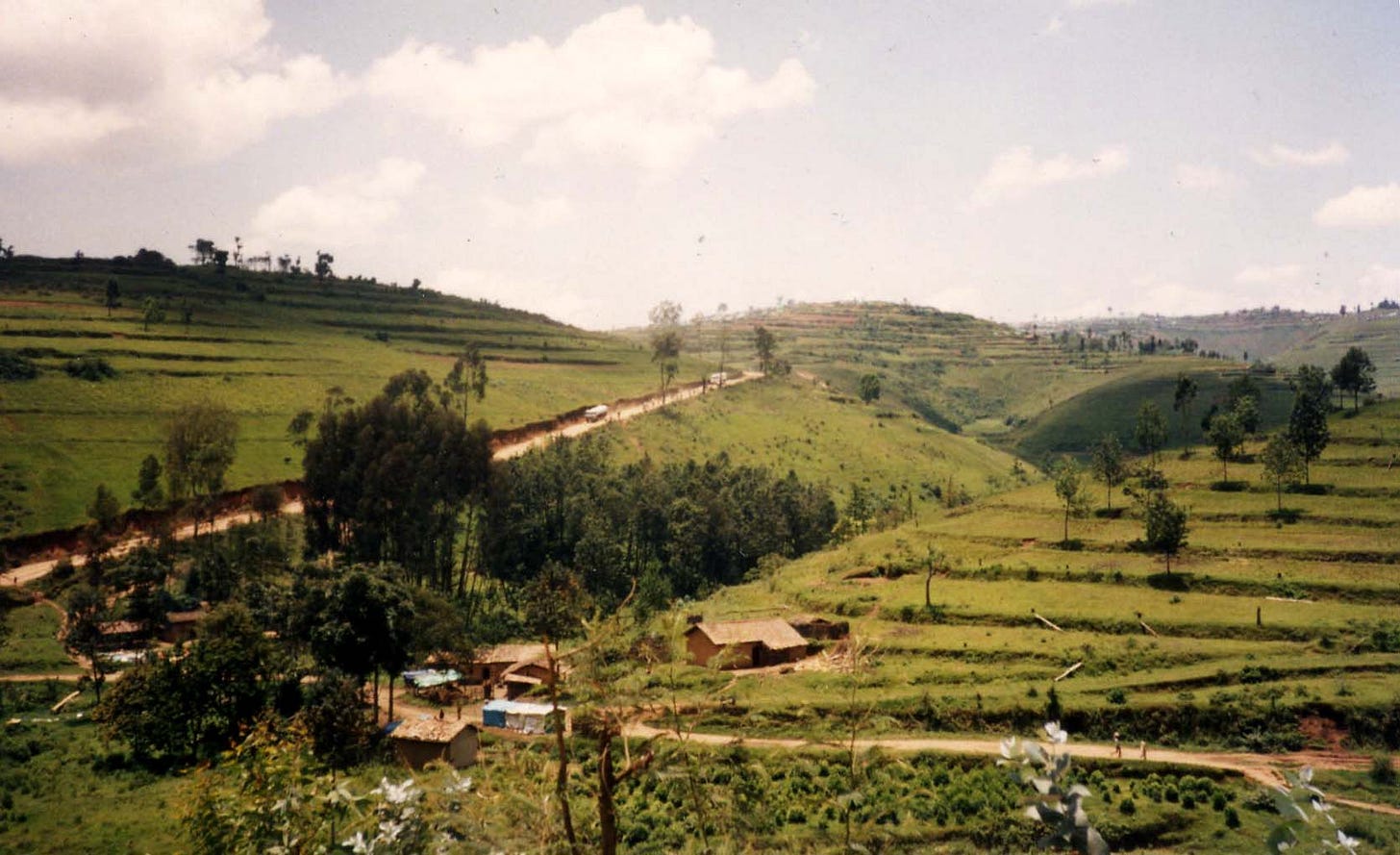What happens when two lives intersect in the aftermath of atrocity, and something tender grows? I wasn’t looking for connection in Rwanda—I was there to bear witness, to investigate, to do my job as a young UN human rights officer in the shadow of genocide. But then came Pascaline. A widow with eyes that held too much, and a presence that softened even the hardest moments. Our meeting was born of tragedy, but what followed was a quiet unfolding—of trust, of friendship, of a kind of grace I didn’t yet have language for. This isn’t just a story about war or justice. It’s about the unexpected places healing begins, and the women—like Pascaline—who teach us how to keep going when the world has fallen apart.
Shadow of Genocide, Rwanda, 1995
I had one week left in my assignment with the UN human rights field mission when the call came: another assassination.
For the past year, I had moved through the wreckage of a country undone—gathering testimony inside overcrowded prisons, walking the blood-soaked floors of churches turned execution sites, stepping through homes where bullet holes outnumbered belongings. I had become fluent in the language of atrocity: patterns of violence, procedures for evidence collection, the bureaucratic cadence of justice delayed. But this one felt different. Something in my gut tightened.
A moderate had been killed. One of the few trying to hold the center—trying to rebuild trust in a place where the very notion had been torn limb from limb. It was a kind of death that carried more than sorrow. It carried warning.
A Funeral, and a Beginning
Now I was being sent to yet another funeral. This one was held in a school compound, where nuns in white habits gathered in silent clusters. Inside a small room, a wooden casket rested beneath a cloth stitched with a purple cross. The air was thick with incense—an earnest attempt to mask the stench of despair. A lone candle cast shadows.
In hushed tones, a woman recounted what had happened. The victim—a man known for his integrity, one of the few remaining voices of reason—had been walking near his home with his wife and a priest when two soldiers stopped them. “Go home and take care of your children,” they told his wife. They ordered the priest away. As she turned to walk away, heart pounding, shots rang out behind her. Her husband had been executed—one bullet through the heart, another through the temple.
In the corner of the schoolroom sat the widow, Pascaline. Her eyes stared past the casket, unfocused, as if trying to land somewhere safer than the present. her children clung to the fabric of her skirt, unaware of the gravity pressing down around them. She stayed upright, shoulders squared as if by force of will, but her face gave her away. Beneath the stillness, you could see it—grief held too tightly, beginning to crack. The tears came quietly, without fanfare. She didn’t wipe them. She just let them fall.
A few days later, I found myself at her doorstep. She welcomed me with the kind of grace that doesn't ask for pity. From a drawer, she pulled out a carefully kept folder—documents that quietly testified to the life and work of her husband. As I spoke with those who had known him, the fragments came together. He was a man of principle. A moderate Hutu who had returned from Belgium, degree in hand, to serve in the trade ministry. He believed in rebuilding—not in revenge. In post-genocide Rwanda, that alone made him a target.
In the Rwanda of that moment, neutrality could be fatal. His identity as a moderate Hutu—someone who refused the pull of extremism, who believed in rebuilding across lines of grief—had placed him squarely in the crosshairs. To complicate matters further, his home had been taken over by an army captain from the Rwandan Patriotic Front, one of countless such appropriations in a country struggling to reassert control. Even his unwavering commitment to peace had become a threat. In a world fractured by suspicion, idealism was dangerous.
After the assassination, danger clung to Pascaline like a shadow. One night, under cover of darkness, she gathered her children and fled—seeking safety across the border in Nairobi. But even there, the turmoil she had barely escaped resurfaced, threading its way through the fraught landscape of the refugee community.
We crossed paths again during a stopover at the end of my mission. Our connection, once born of tragedy, now stretched across borders. In the months that followed, I did what I could from afar—reaching out to diplomats and human rights organizations, trying to help her find a path forward through the tangle of bureaucracy and fear.
It was anything but straightforward. Progress stalled, then lurched, then stalled again. But eventually, a way through emerged. Pascaline was offered the chance to start over in Canada—a world away from what she had endured, and just steady enough for something like hope to begin taking root.
At the Ottawa airport, a small group of volunteers waited to meet her. They held signs with her name, carried donated suitcases filled with winter coats, boots, and basic supplies. For Pascaline, it wasn’t just kindness—it was the first time in a long while that safety felt real, not imagined.
Not long after, she called me from her new home. Her voice was calm, almost disbelieving. “Last night,” she said, “I slept through the night—for the first time in over a year.”
In the years that followed, Pascaline and I kept in touch. She wrote often, sharing stories of her struggles and triumphs as she rebuilt her life and fought to give her children an education. She held the steadfast belief that I had saved her life—a sentiment that made me deeply uncomfortable. I rejected it every time. To me, Pascaline was the undeniable heroine of her own story, carried forward by fierce love and unshakable resolve.
Still, she remained determined to find a way to express her gratitude. After many exchanges, we agreed that I would visit her in Quebec for a long weekend. But each time we moved toward setting a date, I hesitated. Something in me resisted. I feared that accepting her hospitality might feel like accepting the credit she so earnestly—and, in my view, mistakenly—wanted to give me.
But everything shifted with a terminal cancer diagnosis. It forced me to reconsider my resistance to receiving—compliments, care, gestures of love I once deflected. A conversation with my son brought this into even sharper focus. And so, in late 2022, he and I made the journey to Canada, to the quiet town outside Quebec where Pascaline now lived, ready at last to accept her welcome with an open heart.
The weekend was simple and full—meals shared around the table, laughter spilling from the kitchen, the warmth of being welcomed as family. Pascaline introduced us to her grown children, now parents and professionals in their own right, and to a few close friends who had become part of her life in Canada. We did the usual sights in Montreal—the Old Port, a walk up Mont Royal, a stop at Jean-Talon Market—but what mattered most wasn’t the places. It was the quiet joy of being together after all these years, of letting the past and present gently touch.
I took the opportunity to share with Pascaline’s children some of the most meaningful details of my investigative work—pieces of their father’s story they had never known. I spoke of his integrity, his intelligence, his quiet humility, and the circumstances surrounding his death. I also told them about the death threats I received after following up on his case at the Gendarmerie—how even asking questions had become dangerous. As I offered these fragments of truth, the room filled with emotion. Tears flowed freely. One of Pascaline’s children, soon to become a parent himself, told me that hearing these stories had given him a deep sense of peace and closure—just when he needed it most.
By the time we sat together again, any hesitation I’d once felt about our reunion had faded. Whatever roles we’d occupied back then—UN investigator, survivor—they no longer mattered. What remained between us was something quieter, more durable. We had seen each other through too much to hold on to old definitions.
When I first met Pascaline, I couldn’t fully grasp the weight she carried. I was young, idealistic, still believing that justice was mostly a matter of effort and evidence. She knew better. Now, decades later, I understood more. Not because our experiences were in any way the same, but because life—illness, loss, the stripping away of certainties—had taught me. We were two women who had endured different versions of pain and rupture, and who had each learned, in our own way, what it means to go on.
Adversity doesn’t discriminate. It arrives, eventually, in every life—without regard for preparation or fairness. What varies is how we meet it. Thirty years ago, I couldn’t have grasped the full weight Pascaline carried. I had been trained to document suffering, not to inhabit it. But sitting with her now, older and stripped of earlier illusions, I understood more. Not through equivalence but through proximity to pain. Somewhere along the way, the roles had blurred. We were no longer witness and subject. Just two women, both marked by what life had taken, and made more human by what we’d chosen to hold.
Pascaline’s life had settled into a gentle rhythm—retirement, grandchildren, and acts of service directed toward those still navigating the ruins we had once known — in Rwanda and Burundi. Mine had become more precarious. My future had narrowed to a corridor of medical scans and measured hopes. There were days I couldn’t imagine living long enough to see my son graduate. She, who had once been the one in need, now held a kind of steadiness I envied.
And yet the shift felt right. There was no imbalance in it. We carry each other at different times. For years, it had been women like Pascaline—quiet in their endurance, relentless in their dignity—who had taught me how to bear witness to the world’s worst and still believe in something better. Now, facing my own undoing, I returned to those lessons not as theory but as practice. Their resilience had once guided me professionally; now it shaped how I moved through the most personal terrain of all.
Cancer is brutal, but it does not carry the moral weight of genocide. It is an accident of biology, not a failure of conscience. And yet, the aftermaths can feel strangely familiar—grief, uncertainty, the slow work of reconstructing a life from what remains. What endures, in both cases, isn’t the destruction. It’s what survives in spite of it: the quiet sturdiness of love, the radical acts of compassion, the improbable beauty of a friendship sustained across decades and continents. In the wreckage, these are the things that still make sense. These are the truths we build from.
********
For more photos from Rwanda (1994–1995), see: https://pbase.com/kleine/rwanda94_95
Photo credits: Ben Majekodunmi, Roberto Ricci, SKA.









I am new to substack, thanks for accepting my interest to join. I opened and read this very well written story this morning, a first of many I am sure. I love how the author has processed her life now to that of the Rwandan woman's life from before, and how they have in some ways a kind of role reversal. Very interesting, both the work of both people in this story. Thanks for sharing.